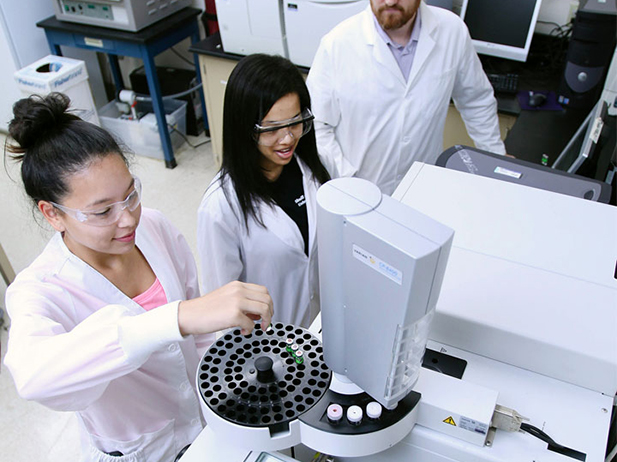The Bachelor of Science in Forensic Science degree is designed to prepare students for careers as forensic scientists and is accredited by the Forensic Science Educational Programs Accreditation Commission (FEPAC) of the American Academy of Forensic Sciences.
Bachelor of Science in Forensic Science

Mission Statement
The mission of the forensic science program is to prepare the student, through the development of student knowledge and laboratory skills, for post-baccalaureate training and careers in forensic science and related fields, in an environment that emphasizes faculty-student mentoring.
Academic and Career Preparation
UT students have interned with many forensic laboratories which enhance the curriculum. Some examples include the following:
- Federal Bureau of Investigation
- Florida Department of Law Enforcement
- Hillsborough County Medical Examiner
- Pinellas County Crime Laboratory
- Defense Forensic Science Center
- National Forensic Science Technology Center
The program also prepares students for graduate programs in forensic science, chemistry, toxicology, biochemistry and health professional schools; alumni from the program are prepared for and have attended, medical school and pharmacy school.
Experienced Faculty
All of the faculty in the program were formerly forensic science practitioners, with experience as crime scene investigators or in forensic laboratories. This ensures that our students are taught by professors who have practiced what they are teaching; they have done forensic science and testified to their results in court.
Employment Opportunities
Graduates of the program are well-prepared for employment with local, state and federal crime laboratories as well as law enforcement agencies. Based on polling, 95% of our graduates from the past three years are employed in forensic science or analytical laboratory science, are in doctoral programs related to their training or are in medical/pharmacy school.
The most considerable portion of graduates (54%) work in forensic science. Our graduates reflect the training of the program. They work throughout the most common subdisciplines of forensic science: crime scene investigation, forensic toxicology, forensic chemistry, friction ridge (fingerprints), forensic chemistry, biology/DNA, and firearm and tool mark examination.
Most graduates who do not enter forensics directly use the analytical skills they learned in their training, commonly in industrial or medical analytical laboratories. Some graduates have used their training to become law enforcement agents, including graduates working as special agents for the Federal Bureau of Investigation and the Air Force Office of Special Investigations.
Additionally, several graduates are in or have attended doctoral programs in top schools in their field.
By the Numbers
- Employment Data
- Internship/Research/Capstone Data
- Enrollment Data
Forensic Science Post-Graduation Employment Data
| Graduation Class of 2021-2022 | Graduation Class of 2022-2023 | Graduation Class of 2023-2024 | |
| Number of graduate with jobs or job offers | 17 | 13 | 7 |
| Number of graduates admitted into an advanced degree program | 0 | 0 | 1 |
| Number of graduates who did not respond to post-graduation survey | 2 | 3 | 4 |

